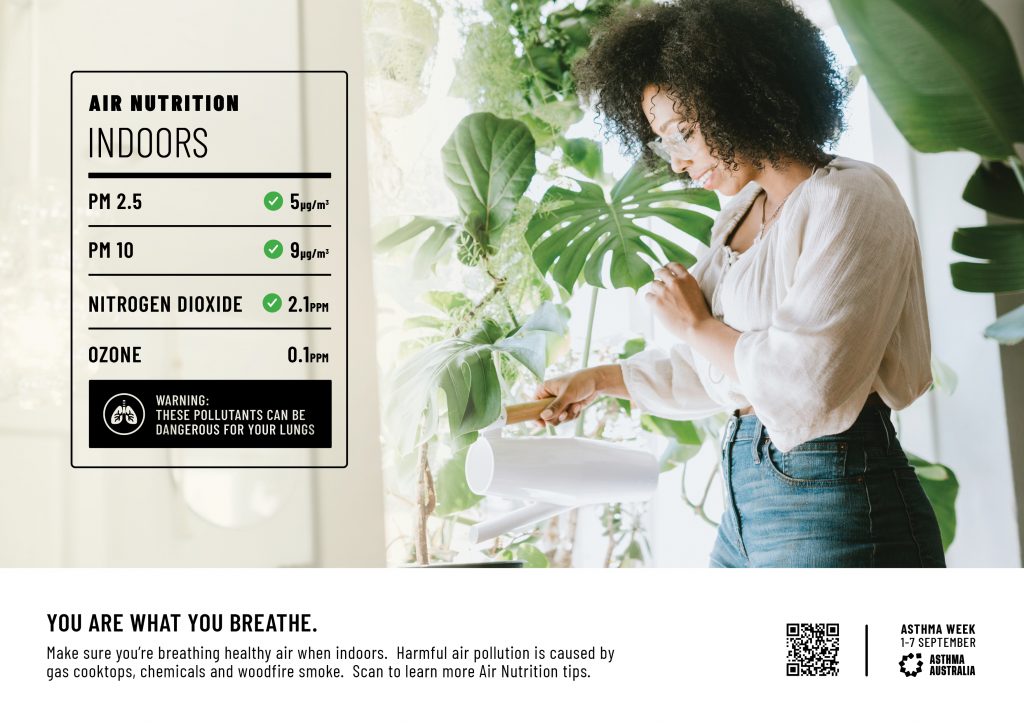
What’s behind “Air Nutrition” – you are what you breathe
In Australia, we consider ourselves to have clean and healthy air, but this is not always the case. Exposure to pollution can have a health impact both daily and over time so it’s important we start caring more about what we’re breathing in.
Many people may be shocked to learn that in 2015, air pollution was estimated to be associated with over 2,500 deaths (1.6% of all deaths) in Australia. Air pollution can also lead to increases in burden of disease including asthma. Short-term and ongoing exposure to air pollutants such as particulate matter (PM2.5 and PM10) and other pollutants and their sources are found in Aussie homes and communities, and can lead to increases in chronic lung diseases including asthma, heart diseases, stroke, and cancer. Common indoor sources include tobacco smoke, wood fire heaters, gas heaters and gas cook tops.
Common sources of air pollution in Australia are woodfire heater/fire smoke, smoke from bushfire and hazard reduction burns, motor vehicle exhausts, industry and dust. Others include emissions from coal fired power stations, metal smelting and general industry.
Already this year, some local communities across the country have at times experienced high levels of air pollution that exceed safe levels.  But the danger can be hidden too. Exposure to air containing small particulates (PM2.5 and PM10) can have health impacts even at very low concentrations. This includes exposure levels currently experienced by people living in urban and rural areas in Australia. Thinking about sources of indoor and outdoor air pollution around out homes, household wood burning, car use, how we commute for work or play, and where we exercise, can all make a difference to our individual and community-wide exposure to air pollution.
But the danger can be hidden too. Exposure to air containing small particulates (PM2.5 and PM10) can have health impacts even at very low concentrations. This includes exposure levels currently experienced by people living in urban and rural areas in Australia. Thinking about sources of indoor and outdoor air pollution around out homes, household wood burning, car use, how we commute for work or play, and where we exercise, can all make a difference to our individual and community-wide exposure to air pollution.
That’s why reducing daily exposure can have immediate and lifelong benefits. Through this campaign we hope that people will think about the everyday health impacts and how to stay safe.
Breathing clean air is as important to our daily health as clean water, food and exercise.
Air Nutrition: You are what you breathe is a campaign to help put air quality health into the minds of everyday Australians, and for all of us to consider the deeper impact this has on our health and on people with asthma and other sensitivities.
The campaign has borrowed the graphic language of a food label to create a mental ‘short-cut’ to help people connect breathing air with health.
This campaign is the focus of Asthma Week 2021. Meanwhile, Asthma Australia has started building a public health and behaviour change program ‘AirSmart’. The need for an air quality public education program erupted from the 2019/2020 bushfires and subsequent government inquiries – to help address public health concern when our cities and towns were trapped under thick plumes of smoke. The pilot is scheduled to launch in early 2022, to eventually scale up into a national campaign. AirSmart is aimed to influence general change towards air pollution, the way SunSmart did with UV rays.





 1800 278 462
1800 278 462